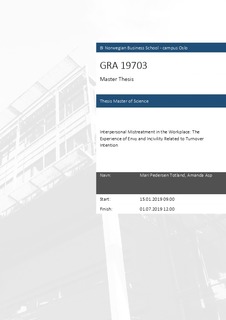Interpersonal Mistreatment in the Workplace: The Experience of Envy and Incivility Related to Turnover Intention
Master thesis
Permanent lenke
http://hdl.handle.net/11250/2621210Utgivelsesdato
2019Metadata
Vis full innførselSamlinger
- Master of Science [1621]
Sammendrag
Workplace incivility violates the norms of mutual respect between employees.
Milder forms of aggression are common in business, despite their negative
interpersonal effects and impact on organizations as a whole. Even so, research on
the construct of experienced workplace incivility is sparse. We suggest the
perception of being envied to be an antecedent of experienced workplace incivility
and provide an exploration of turnover intention as a conceivable outcome via
organizational commitment.
The purpose of the following research study is to enhance the understanding of
workplace incivility, given its existing presence as an organizational construct.
Through an increased awareness of the antecedents and outcomes of incivility,
unfavorable implications may be avoided and thereby improve future
organizational well-being.
Through the use of a cross-sectional research design with 187 participants from the
Norwegian health care sector, findings revealed that employees who experienced
envy from others were also more prone to experience workplace incivility.
Furthermore, the experience of workplace incivility was directly and significantly
related to turnover intention, although including organizational commitment as a
mediator of the relationship provided a better model fit. A novel contribution to the
research field was the concentration on the perceived experience of incivility, rather
than on the actual behaviors.
Related limitations and implications of the findings are thoroughly discussed before
concluding with an outline for possible future research.
Keywords: envy, workplace incivility, organizational commitment, turnover
intention
Beskrivelse
Masteroppgave(MSc) in Master of Science in Leadership and Organizational Psychology - Handelshøyskolen BI, 2019
